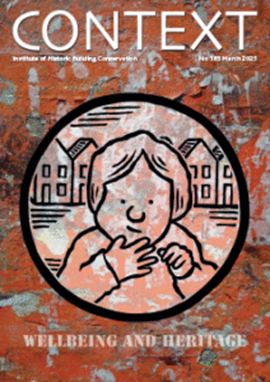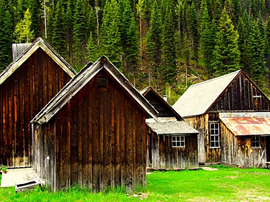Productive Placemaking
In September 2020, The All-Party Parliamentary Group (APPG) on Building Communities published ‘Productive Placemaking’.
The APPG wrote:
To combat these feelings of loneliness and isolation, we will need to work harder to make normal activities pleasurable, safe and healthy and, where possible, re-think our development models to ensure that people are able to go shopping, spend time in nature or to see a doctor within a 10-15 minute walk from home. We will need see developers and planners push for a better use for space – we can no longer just fill in unused spaces with car parks – we need bike racks, children’s playgrounds, nature trails, outdoor gyms, community allotments, and more
This report has a number of great examples of good design and stewardship which promotes good mental and physical health and produces positive and productive places. We must not forget that these are also fundamentally important to delivering community, which will be the best way to ensure our villages, towns and cities are resilient to the effects of the exceptional times we are living through and that they will flourish in the years and decades to come….
Our recommendations are:
- MHCLG should incorporate placemaking at the heart of the text of the National Planning Policy Framework (NPPF).
- Local industrial strategies should incentives developers to share best practice in terms of community engagement on major projects, as a driver of productivity.
- Financial and policy structures need to be in place to secure a productive development strategy and to ensure long-term management of a place.
- ONS must recognise and develop a measurement of placemaking and its link to productivity of a community and/or contribution to GDP.
- The UK Government should aim to reduce the cost of land for the creation of affordable housing.
- Replace the Community Infrastructure Levy (CIL) with a new Property Sales Levy.
This article originally appeared as APPG on Building Communities publishes ‘Productive Placemaking Report’ on the IHBC NewsBlog on 4/11/2020.
--Institute of Historic Building Conservation
Related articles on Designing Buildings Wiki
- Genius loci.
- IHBC articles.
- Institute of Historic Building Conservation.
- Landscape architect.
- Masterplanning.
- Neighbourhood planning.
- Place.
- Placemaking.
- Place-shaping: a shared ambition for the future of local government.
- Planning4People.
- Public realm.
- Putting the empathy back in architecture.
- The role of civil engineering in designing out loneliness.
- Town planning.
- Urban fabric.
IHBC NewsBlog
IHBC Context 183 Wellbeing and Heritage published
The issue explores issues at the intersection of heritage and wellbeing.
SAVE celebrates 50 years of campaigning 1975-2025
SAVE Britain’s Heritage has announced events across the country to celebrate bringing new life to remarkable buildings.
IHBC Annual School 2025 - Shrewsbury 12-14 June
Themed Heritage in Context – Value: Plan: Change, join in-person or online.
200th Anniversary Celebration of the Modern Railway Planned
The Stockton & Darlington Railway opened on September 27, 1825.
Competence Framework Launched for Sustainability in the Built Environment
The Construction Industry Council (CIC) and the Edge have jointly published the framework.
Historic England Launches Wellbeing Strategy for Heritage
Whether through visiting, volunteering, learning or creative practice, engaging with heritage can strengthen confidence, resilience, hope and social connections.
National Trust for Canada’s Review of 2024
Great Saves & Worst Losses Highlighted
IHBC's SelfStarter Website Undergoes Refresh
New updates and resources for emerging conservation professionals.
‘Behind the Scenes’ podcast on St. Pauls Cathedral Published
Experience the inside track on one of the world’s best known places of worship and visitor attractions.
National Audit Office (NAO) says Government building maintenance backlog is at least £49 billion
The public spending watchdog will need to consider the best way to manage its assets to bring property condition to a satisfactory level.

















